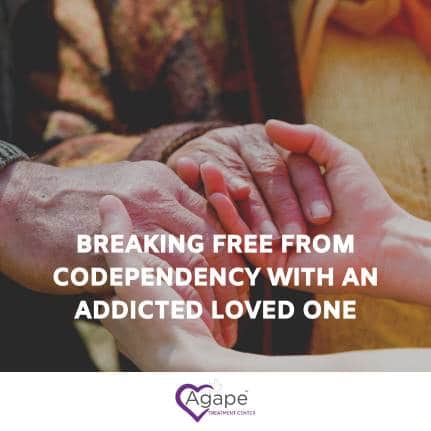
However, many close relationships have the opposite effect. Addiction is described as a family disease, one that is full of codependency and dysfunction. If these issues are not addressed, there is an increased potential that the individual will either refuse help or relapse even after completing a substance abuse treatment program.
Codependency within a relationship between an addict and their family or friends can further propel the individual’s substance abuse disorder. The codependent individual may interfere with the addicted individual’s aftercare plan, resulting in relapse and a return to a destructive, addicted lifestyle.
Table of Contents
ToggleWhat is Codependency?
According to an article published on Psych Central: “Codependency is characterized by a person belonging to a dysfunctional, one-sided relationship where one person relies on the other for meeting nearly all of their emotional and self-esteem needs. It also describes a relationship that enables another person to maintain their irresponsible, addictive, or underachieving behavior.”
In other words, codependency defines an unhealthy relationship in which one partner has extreme physical or emotional needs and the other partner spends an extensive period of time responding to those needs. This often leads to neglect of the codependent partner’s responsibilities, other relationships, and overall life. Ultimately, codependent relationships can lead to enabling the destructive behaviors of an individual and the detriment of the codependent partner.
Common symptoms of codependency may include:
- People-pleasing: A codependent person is heavily influenced by the opinions of others. This specific type of individual will go to great lengths to make sure others have a positive opinion of them. For example, the individual often feels intense guilt or inability to say “no” to others.
- Low Self Esteem: The person struggling with codependency often feels unlovable outside of their codependent role within their unhealthy relationship. This person often relies on the opinions of others to feel self-worth.
- Caretaking: At the expense of self-care, this individual will feel it is their sole purpose to take care of others. The person will not feel secure unless they are needed.
- Obsessive Relationships: The codependent individual is often defined by his/her relationships, therefore, this may become an obsession for the individual. Relationships may actually lack emotional intimacy due to this factor.
- No Boundaries: The codependent partner is often absent from boundaries for oneself or others. Oftentimes, these individuals may offer unwanted advice, assume responsibility for the feelings of others, or attempt to manipulate and control others to gain security.
- Dysfunctional Communication: Codependents struggle with communicating their own thoughts, feelings, and needs. These individuals often struggle with knowing their own truth out of fear of disappointing or losing the approval of others.
- Denial: Usually, codependents are in denial about their issues. They tend to generally blame the issues on the other person without owning their role in the demise of the relationship. They often pay attention to the needs of others, neglecting their own.
- Painful Emotions: Codependency often leads to stressful and painful emotions. Shame, low-self esteem, anxiety, fear of judgment, rejection, abandonment, failing, being trapped, or even being alone are all common painful emotions codependents experience.
Codependency and Substance Abuse
Codependency is not always co-occurring with substance abuse disorders. However, this concept was first acknowledged by Mental Health America in relation to family members of individuals struggling with alcoholism. Codependency is often found in individuals who are close to individuals struggling with addiction. Codependency within these relationships can manifest in multiple ways:
- Both partners are both abusing drugs
- Close adult family members
- Children of alcoholics/drug addicts
- Significant others of the individual abusing drugs/alcohol
The codependent partner is not always the spouse or even the parent of an addicted individual. Oftentimes, the children of addicts and alcoholics become codependent. According to many sources in the scientific community, once the disease of addiction has taken over, the child will often assume the role of caretaker over his/her own parent.
Negative Effects of Codependency for the Addicted Individual
Codependency can have severe negative consequences and risks for the addicted individual. These types of relationships can affect the addiction as well as potential substance abuse treatment outcomes for the addict. The codependent relationship often serves as an enabling fuel in the addicted person’s life and their addiction. The codependent person believes they are helping their loved one. However, the codependent often fears the addicted individual won’t need them anymore if they get sober and this idea tends to throw off effective attempts to get help.
Common examples of unhealthy enabling behaviors include:
- Making excuses or covering the errors and mistakes of the user
- Co-signing excuses for the individual abusing substances
- Taking the emotional and physical responsibilities of the user
- Cleaning up after the user
- Helping the user financially
- Housing the substance abuser
- Providing transportation for the user
- Diminishing boundaries for the user
This can be a major risk factor for individuals seeking substance abuse treatment. The codependent feels dependent on the addiction to maintain a relationship with the drug/alcohol abuser. Therefore, codependency can actually increase the risk of relapse and treatment for codependency should be a component of the addict’s treatment plan.
Breaking Free From Codependency
Stepping out of codependency requires courage and support. Naturally, it is terrifying to watch your loved one struggle from the despairing disease of addiction. Breaking free from the enabling and codependent family dynamic requires confronting the fear of losing our spouse, parent, child, or our loved one to the grips of addiction. Many codependents believe that if they can at least keep an eye on their loved one and maintain contact, their addicted loved one is relatively safe. The truth is, addiction is destroying the addicted loved one and their family.
Support groups like Al-anon and Nar-anon help codependents develop support and hope for the future. Many codependents will learn how to balance the difference between acceptance of addiction and the need for change in how they interact with it. Codependents should encourage their addicted loved ones to seek treatment. Once the addict enters treatment, the codependent partners can seek out family counseling services or family programs provided by the facility. Continue to develop ongoing support, set healthy boundaries, and find a new sense of freedom in your life by seeking help for your codependency.






